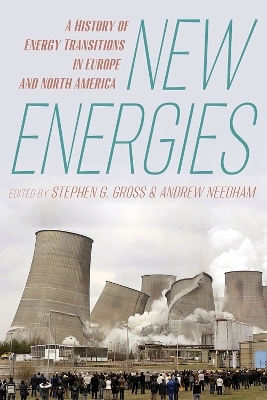
New Energies
A History of Energy Transitions in Europe and North America
Seiten
2024
University of Pittsburgh Press (Verlag)
978-0-8229-4776-9 (ISBN)
University of Pittsburgh Press (Verlag)
978-0-8229-4776-9 (ISBN)
Volume historicizing energy production and consumption which foregrounds the importance of energy for big historical questions.
Over the past 250 years, energy transitions have occurred repeatedly—the rise of coal in the nineteenth century, the explosion of oil in the twentieth century, the nuclear utopianism of the 1950s and 1960s. These transitions have been as revolutionary as any political or economic upheaval, and they required changes in infrastructure and behaviour. Yet new energies never wholly replace old ones. This volume historicizes energy production and consumption while demonstrating how energy use has reshaped everything from social life and economic organization to political governance. It foregrounds the importance of energy for big historical questions about capitalism, democracy, inequality, the environment, and identity, and it argues that energy systems themselves merit attention as key agents of historical change. Given the urgency of climate change, and the central position that energy plays in causing and potentially solving global warming, this volume engages history as a discipline in the debate over what may be most monumental energy transition of all time: the shift away from fossil fuels.
**PRAISE**
"A meticulously researched and presented collection that sets the agenda for future energy transitions research." _~H-Net Reviews_
"A remarkable and welcome contribution to scholarly work available on energy transitions. It tells hidden histories and counternarratives around climate change, the history of environmentalism, nuclear energy, and nuclear risk. It illustrates the fraught, complex, contested, and nonlinear nature of energy transitions and how it can inform the current transition. A must-read for any energy historian." _~Jeffrey Jacquet, Ohio State University_
Over the past 250 years, energy transitions have occurred repeatedly—the rise of coal in the nineteenth century, the explosion of oil in the twentieth century, the nuclear utopianism of the 1950s and 1960s. These transitions have been as revolutionary as any political or economic upheaval, and they required changes in infrastructure and behaviour. Yet new energies never wholly replace old ones. This volume historicizes energy production and consumption while demonstrating how energy use has reshaped everything from social life and economic organization to political governance. It foregrounds the importance of energy for big historical questions about capitalism, democracy, inequality, the environment, and identity, and it argues that energy systems themselves merit attention as key agents of historical change. Given the urgency of climate change, and the central position that energy plays in causing and potentially solving global warming, this volume engages history as a discipline in the debate over what may be most monumental energy transition of all time: the shift away from fossil fuels.
**PRAISE**
"A meticulously researched and presented collection that sets the agenda for future energy transitions research." _~H-Net Reviews_
"A remarkable and welcome contribution to scholarly work available on energy transitions. It tells hidden histories and counternarratives around climate change, the history of environmentalism, nuclear energy, and nuclear risk. It illustrates the fraught, complex, contested, and nonlinear nature of energy transitions and how it can inform the current transition. A must-read for any energy historian." _~Jeffrey Jacquet, Ohio State University_
| Erscheinungsdatum | 24.02.2023 |
|---|---|
| Verlagsort | Pittsburgh PA |
| Sprache | englisch |
| Maße | 152 x 229 mm |
| Themenwelt | Naturwissenschaften ► Biologie ► Ökologie / Naturschutz |
| ISBN-10 | 0-8229-4776-5 / 0822947765 |
| ISBN-13 | 978-0-8229-4776-9 / 9780822947769 |
| Zustand | Neuware |
| Haben Sie eine Frage zum Produkt? |
Mehr entdecken
aus dem Bereich
aus dem Bereich


